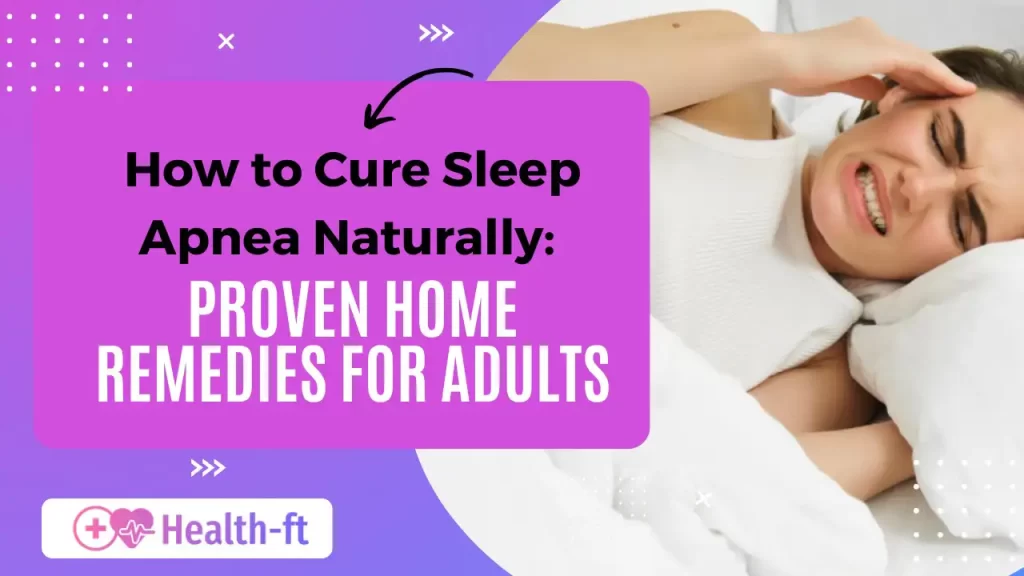Sleep apnea is widely known, and many individuals seek ways to cure sleep apnea naturally, as it affects sleep. Sleep apnea is estimated to affect millions of adults globally and is characterized by disturbed sleep, daytime fatigue, and other complications if the condition is not addressed. CPAP machines and surgery are some ways to treat sleep apnea, But many people would prefer non-medical methods to deal with or even eliminate the condition. This article explicitly explores sleep apnea home remedies for adults that effectively reduce the signs of sleep apnea, thus aiding in enhancing the quality of your sleep.
What is Sleep Apnea?
Sleep apnea is a breathing disorder that entails that an individual experiences disruption of breathing while asleep. These interruptions are called apneas and may range from brief, lasting several seconds, to somewhat longer, lasting a couple of minutes, and may happen 30 or more times per hour. The nominal form of sleep apnea is Obstructive Sleep Apnea (OSA), which occurs when the muscles in the throat relax, thus leading to temporary closure of the airway.
Sleep apnea is a chronic condition that affects millions of adults globally. According to the National Heart, Lung, and Blood Institute, about 50 to 70 million Americans suffer from sleep disorders, with one in three adults not getting the recommended amount of sleep they need to protect their health. This widespread issue makes finding effective treatments, including natural remedies, a priority for many.
What are the Types of Sleep Apnea?
There are three different types of sleep apnea that medical professional distinguish, and each of them has their own set of triggers and features:
Obstructive Sleep Apnea (OSA)
Obstructive Sleep Apnea (OSA) is the most commonly found disorder, which occurs due to the excessive loosening of throat muscles during sleeping, resulting in a limitation of an airway. This process hinders breathing and can affect the overall quality of sleep. The recommended approaches for obstructive sleep apnea treatment are alteration in lifestyle, continuous positive airway pressure therapy, oral devices, and in certain circumstances surgery too.
Central Sleep Apnea (CSA)
One of the types of sleep disorders are CSA which occurs due to necessary signals not being sent to the breathing muscles from the brain. This type does not relate to an airway blockage like OSA rather it involves neurological disorders. The treatment advice is usually common diagnosing of the diseases, try and use adaptive ventilating devices or oxygen.
Complex or Treatment Emergent Central Sleep Apnea
This is the type when a patient undergoing OSA develops central sleep apnea while undergoing CPAP treatment. This Can be referred to as both obstructive and central type and requires individualized approaches.
People aiming to fix sleep apnea naturally can consider treating it with the help of proper weight loss, positional aids, refraining from alcohol and medication, self-care routines for sleeping, and respiratory workouts like the oropharyngeal approach for respiratory muscle enhancement.
What are the Symptoms of Sleep Apnea?
It is very important to identify signs and symptoms of sleep apnea to seek early treatment. Common signs include:
Loud Snoring:
Sometimes, snoring sleep apnea is the first sign and the first thing that one recognizes especially when one accompanies it with choking or gasping.
Episodes of Stopped Breathing:
Such episodes are usually watched by another individual or partner, most commonly a husband or a wife.
Gasping for Air During Sleep:
This happens in case the body assumes that you are in a state of oxygen deprivation and hence WAKES you up in the process.
Morning Headaches:
Due to circulatory problems as a consequence of reduced oxygenation at night.
Excessive Daytime Sleepiness:
Often even after eight hour’s sleep, people feel very tired throughout the day.
Difficulty Staying Asleep (Insomnia):
The countless interferences mean that one can hardly achieve a comfortable night’s sleep.
How to Cure Sleep Apnea Naturally?
Although medications, continuous positive airway pressure (CPAP) machines, and surgeries are effective treatments, many patients avoid them due to potential complications. This leads many to ask, is sleep apnea a disability if left untreated? While medical treatments can help, some individuals seek natural remedies as a less intrusive alternative. Below is a list of home remedies that may help alleviate breathing difficulties at night.
Maintain a Healthy Weight
Obesity is also unhealthy as it causes one to have extra fat around the neck and the chest making it difficult for the airways to remain open at night.. The fat deposits in the upper airway cause narrowing of the airways hence reduced passage for air to travel through. Researchers have also found that if a person loses as little as five percent of their weight they experience reduced symptoms of sleep apnea. However, even a weight loss, which means a decrease of the body weight by only 10%, can decrease the number of apneic events by up to 26%.
Natural Weight Loss Strategies
Maintaining a healthy weight is not just about counting calories; it’s about adopting a balanced lifestyle that includes Losing weight and consequently controlling the calorie intake is not a simple process of counting the number of calories we consume. It means living a healthy life style which involves:
Balanced Diet:
They should also eat dishes most of which are not refined or processed food products or the minimal processed foods of real value. Make sure that they consume foods that include fruits, vegetables, and whole grain, lean meat, and healthy fats. A person should not consume foods that are rich in carbohydrates, sugars, or bad fats as these will contribute to increase in weight and inflammation.
Regular Exercise:
Moderate intensity activities: at least 30 min, at least 5 days per week – walking briskly, swimming or cycling etc. Exercise lowers the amount of fats in the body, which is a good thing for weight loss and next to this, sleep apnea patients’ cardiovascular system is built up to help handle the pressure of the apnea.
Portion Control:
Passions are to he restrained and one should not eat to his/her full this food or eat just before going to bed. This is an indication that; eating little quantities of foods at intervals is more beneficial to the body than chewing large quantities of foods in between the day.
What are the Impacts of Sleep Position on Sleep Apnea?
Positional factors are believed to play a significant role in worsening sleep apnea. The best sleeping position for sleep apnea is typically on your side. Sleeping on your back is especially problematic, as it allows the tongue and soft tissues at the back of the throat to collapse backward, obstructing the airway. This position increases the likelihood of snoring and sleep apnea episodes. In contrast, sleeping on one’s side helps keep the airway open, reducing snoring and apneic episodes.
Tips for Side Sleeping
If you’re not naturally inclined to sleep on your side, here are some tips that can help to reduce overnigtht sleep with stress. However, if sleeping on your side is not in your DNA, here are a few tips that you could try out:
Use a Body Pillow:
A body pillow may provide support for the back, and prevent a person from moving to the back during the night. It can also help perhaps to align your spine to a better position, reducing pressure on the neck or shoulder.
Elevate Your Head:
Some techniques regarding clearing of the airway include positioning the head and upper part of the body two to four inches above the rest of the body using pillows or placing a wedge pillow under the head and shoulders. This position can also help prevent the manifestation of acid reflux which is a widespread problem to those having sleep apnea.
Sew a Tennis Ball into Your Pajamas:
This old-school trick is carried out by sewing a tennis ball on the back side of your pajamas. The ball will make you uncomfortable when sleeping. Hence, you must maintain the side position throughout the night.
What Is The Role of Sleep Hygiene in Managing Sleep Apnea?
Sleep hygiene refers to habits and practices that promote better sleep in frequency and duration. Here are some guidelines to help you maintain proper sleep hygiene:
Establish a Regular Sleep Schedule:
Sleeping and waking up simultaneously every day is important. Consistency helps regulate your body’s internal clock and improves sleep quality.
Create a Relaxing Bedtime Routine:
Set aside time before bed to engage in activities that help you relax, such as reading a book, listening to soothing music, practicing deep breathing, or taking a warm bath. These activities signal to your body that it’s time to wind down, making it easier to fall asleep.
Limit Screen Time:
Avoid using electronic devices such as smartphones, tablets, or computers for at least one hour before bed. The blue light emitted by these devices interferes with the production of melatonin, a hormone that regulates sleep.
Make Your Bedroom Conducive to Sleep:
Ensure your bedroom is an ideal environment for sleep. Keep the room cool, dark, and quiet. Block out light with blackout curtains, and consider using earplugs or a white noise machine to minimize disruptive sounds. A comfortable, restful environment promotes better sleep quality.
What are the Daily Exercises for Sleep Apnea?
Certain muscles involved in speech, such as those in the throat and tongue, may collapse during sleep, leading to airway blockages. Fortunately, specific exercises can help strengthen these muscles and reduce the severity of sleep apnea over time. These exercises are simple, can be performed independently, and require minimal time.
Tongue Slide:
Press the tip of your tongue against the roof of your mouth and slide it backward. Perform this exercise 10-15 times daily to strengthen the muscles at the back of your throat.
Throat Exercise:
Articulate the vowels “ah, eh, ee, oh, oo” loudly for at least 5 minutes, three times a day. This exercise helps tone the throat muscles, reducing snoring and improving airway stability.
Mouth Exercise:
Extend your lips, close them tightly, and inhale through the mouth while keeping your lips sealed. Hold this position for 5 seconds, then repeat 10 times. This exercise targets the muscles around the mouth and helps stabilize the airway.
Aerobic Exercise:
Engage in moderate-intensity activities like walking, jogging, swimming, or cycling for at least 150 minutes per week. These exercises benefit both the heart and lungs, which can positively affect sleep apnea symptoms.
Yoga:
Yoga is an excellent way to strengthen respiratory muscles and improve flexibility. Breathing exercises and poses can expand the chest cavity, enhancing breathing during sleep. Additionally, yoga helps alleviate stress, which improves sleep quality.
What are the Benefits of Moist Air to Cure Sleep Apnea Naturally?
Dry air is also destructive to the respiratory system of the human body. It aggravates apnea symptoms by causing blockage of nasal passages and irritation of the throat lining. Increasing the use of a humidifier helps add the proper moisture level in the air, thus being one of the best home remedies for sleep apnea.
The following are the procedures for how to use a humidifier:
Add Essential Oils:
It is advisable to pour into the humidifier few drops of such essential oils as lavender or eucalyptus. Some of these oils can provide added comfort and therefore enable easier breathing at night if for instance one has breathing issues.
Clean Regularly:
Make sure not to cause yourself to short breathe because this could have been caused by mold, bacteria or any other form of dirt which has developed on your humidifier, make sure that you clean it often.
How Herbal Remedies Cure Sleep Apnea?
Some herbs are natural sedatives that may assist in getting better sleep and those suffering with sleep apnea. Even though these herbs do not treat sleep apnea, they are something that would be beneficial in the overall goal of treating the condition and enhancing your sleep quality.
Consider incorporating these herbs into your nightly routine:
Chamomile:
Chamomile has a mild sedative on the body making it famous in uplifting a feeling of relaxation and even encourage sleep among the users.
Lavender:
Lavender is one more herb that has a lot of positive effects on a human body and which is mostly used for calming. Lavender can be ingested in form of essential oil or come in form of tea that has benefits such as reducing anxiety and helping on get a good sleep.
What is The Role of Hydration in Sleep Apnea?
Dehydration can lead to dryness in the mouth and nostrils, which contributes to snoring and worsens the severity of sleep apnea. Ensuring proper hydration throughout the day helps keep the airway moist, reducing the risk of blockage.
Drink Water Throughout the Day:
Aim to drink at least 2,500 milliliters of water daily to stay properly hydrated. However, avoid consuming excessive water before bed to prevent frequent nighttime trips to the bathroom.
Avoid Caffeinated Beverages:
Caffeine acts as a diuretic, causing increased urination, which can lead to dehydration. Additionally, caffeine can negatively affect sleep quality. To avoid these issues, refrain from consuming caffeinated foods or drinks in the afternoon or evening.
How Alcohol and Sedatives Worsen Sleep Apnea
Alcohol and sedatives relax the muscles at the back of the throat, increasing the likelihood of airway collapse during sleep. These substances also depress the central nervous system and reduce the body’s responsiveness to apneic events. By minimizing or avoiding alcohol and sedatives, you can improve sleep quality and reduce the frequency of sleep apnea episodes.
Conclusion: Embracing a Natural Approach to Cure Sleep Apnea
Sleep apnea is a chronic condition that affects overall well-being. While various treatments exist, this article focuses on how to cure sleep apnea naturally through lifestyle changes and natural remedies to alleviate symptoms and improve sleep quality. Losing weight, maintaining a regular sleep routine, eating healthily, and exercising can help reduce sleep apnea severity.
However, sleep apnea is a medical condition, and these remedies should be used alongside professional advice. Always consult a doctor before making any changes to ensure they are suitable for your specific situation.




